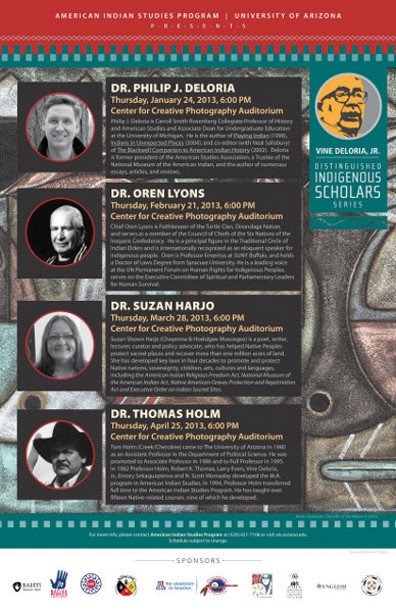A scholars series will help celebrate the 30th anniversary of the American Indian studies program at the UA.
Today marks the first part of this year’s four-part Vine Deloria Jr. Distinguished Indigenous Scholars series, the fifth event of its kind. Five years ago, the AIS program set out to memorialize a prominent American Indian scholar activist and UA professor by raising awareness of issues affecting the indigenous community.
“[Deloria Jr. is] one of the forefathers of American Indian scholarship,” said Mark Blair, AIS graduate program coordinator, “so his name carries a lot of weight and he was integral in getting our program started.”
Deloria Jr. is credited with helping establish the AIS master’s program at the UA in 1982, the first program of such level in the United States.
“He was one of the first scholars to challenge academia and challenge the status quo when it comes to ethical and American Indian studies,” Blair added.
Beyond the classroom, others believe that the public’s understanding of American Indians still leaves much to be desired. This lecture series, which consists of lectures from leading indigenous figures, aims to help resolve that problem.
“It’s a platform to not only bring scholarship, but also awareness to the general public,” said Gavin A. Healey, an AIS doctoral student and coordinator for the event.
The theme is “Unfinished Agendas: Indigenous Peoples in the 21st Century” and the four speakers will be, in order of appearance, Philip J. Deloria, Oren Lyons, Suzan Harjo and Thomas Holm. Coordinators left the theme open-ended so as to not limit speakers, who will present a “very candid insider view” on the history of indigenous rights, according to Healey.
“We’ve set up a really strong speakers series,” he added. “I don’t think one will be better than the other. They will all be worth seeing no matter what walk of life you come from.”
Healey said he is specifically excited to hear Deloria Jr.’s son, Phillip Deloria, tell personal tales of the former UA professor from outside of his fabled public life.
In the academic world, Deloria Jr. was one of the first to put pressure on governments by writing about injustices affecting American Indians in the ’50s and ’60s, according to Manley Begay, an AIS associate social scientist.
“This struggle continues,” Begay added. “There are so many issues American Indians are contending with.”
Begay believed to “maintain and strengthen” political sovereignty is at the forefront of the “unfinished agendas” list, but added that the list also covers sacred site, economic, land and water problems.
Following Philip Deloria’s lecture today, Lyons speaks on Feb. 21, Harjo speaks on March 28 and Holm finishes the series on April 25. Each chapter of this series will be held at the Center For Creative Photography at 6 p.m. on its designated date.
“We’ve set up a great list of speakers who will speak to a wide variety of issues and personal insight to their journey of where they started and where they are now,” Haley said.








